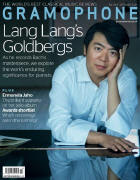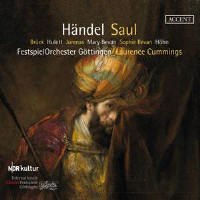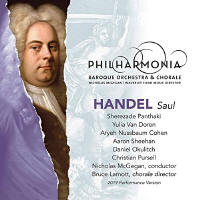Texte paru dans: / Appeared in:
|
|||||||
|
Outil de traduction (Très approximatif) |
|||||||
|
Reviewer: Richard Wigmore Long a rarity on disc, Saul has been handsomely served in the CD era, with outstanding versions by Gardiner (Philips, 8/91), McCreesh (Archiv, 6/04), Jacobs (Harmonia Mundi, 11/05) and Christophers (Coro, 10/12). If neither of these new live recordings displaces them, both are enjoyable: well sung and characterised, and convincingly (often swiftly) paced by two seasoned Handelians (McGegan was Cummings’s predecessor as director of the Göttingen Handel Festival). Both orchestras and youthful-sounding choruses are excellent, with McGegan’s San Francisco forces, especially, relishing the ceremonial splendour of the opening tableau, darkly rasping trombones to the fore. While Cummings’s NDR singers produce a more smoothly blended sonority, McGegan’s choir is that much more vivid with its words. The only disappointment here is the implacable ‘Envy’ chorus, which begins unsteadily and lacks the cumulative terribilità of Cummings’s performance. Of the soloists, Mary and Sophie Bevan, for Cummings, come close to my Handel ideal. Mary, as Michal, communes tenderly with flute in an assuaging ‘Fell rage and black despair’, and burns vehemently into ‘No, let the guilty tremble’. Sophie, slightly richer of tone, catches all of Merab’s diva-ish hauteur and after her ‘conversion’ sings an exquisitely poised ‘Author of peace’. Mingling purity and warmth, McGegan’s Michal, Sherezade Panthaki, is hardly less touching than Mary Bevan. His Merab, Yulia Van Doren, has a light, soubrettish timbre: attractive enough, though she sounds a touch shrill in her outraged rejections of David. Yet on the whole McGegan’s performance fields the stronger cast. As Saul, Cummings’s Markus Brück – a high baritone in a bass role – is well inside the character, but lacks the sonorous depth of McGegan’s impressive Daniel Okulitch and is inclined to equate derangement with shouting. The coloratura of ‘A serpent, in my bosom warmed’ is evidently beyond him. Without compromising his oaken tone, Okulitch powerfully conveys Saul’s descent into madness and terrible final self-knowledge at Endor. The countertenor Eric Jurenas, the David on the Cummings recording, fields a ringing top register yet tends to sing notes rather than phrases. He is outshone by the rich-toned Aryeh Nussbaum Cohen, whether in a beautifully sculpted ‘O Lord whose mercies wonderless’ or the noble elegy of ‘O fatal day’. While both Jonathans have agreeable lyrical voices, Benjamin Hulett, for Cummings, scores over Aaron Sheehan in incisiveness and clarity of diction. Conversely, McGegan’s Witch of Endor lets Handel’s skewed, sinister music speak for itself where his counterpart, who elsewhere sings well as the High Priest, adopts a wheezy old crone voice: not to my taste. While I’m happy to have heard both new recordings, my first choice, as in my Gramophone Collection (4/18), remains Harry Christophers, with a uniformly fine cast led by Christopher Purves’s outsize, brooding Saul. If you are contemplating either of the new versions, two other factors may sway you. The San Francisco performance is available as a download only, and is, in the note writer’s words, ‘judiciously trimmed’, while Cummings gives Handel’s score complete. McGegan’s cuts mean the omission of the moralising High Priest (fair enough, though even here we lose some fine music), and a couple of less interesting arias for Jonathan and David plus, less judiciously, a whopping excision near the beginning of the muscular final chorus. |
|||||||





